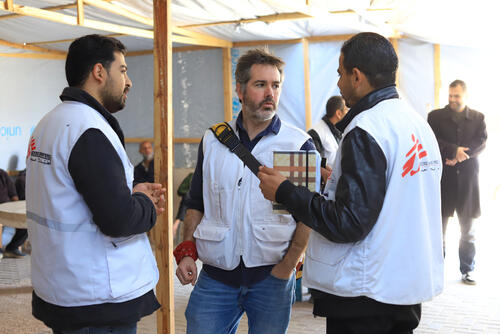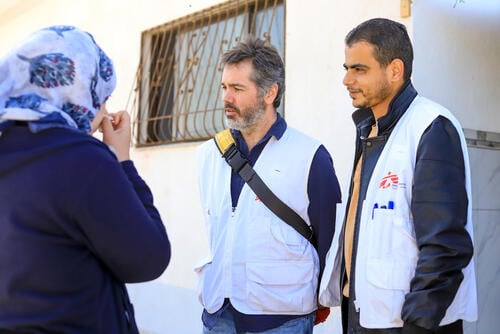The following remarks were made by Christopher Lockyear, Secretary General Médecins Sans Frontières (MSF) International, to members of the press during a briefing on the war in Gaza, Palestine, on 4 April.
I want to extend my deepest condolences and those of the entire MSF family to the family, friends, and co-workers of the seven colleagues from the World Central Kitchen, who were brutally killed two days ago.
We, like many organisations, depended on them for feeding patients and staff. I personally saw our staff waiting for them to bring food before leaving work at the end of the day.
Since the beginning of the war, nearly 200 humanitarian workers have been killed, including five MSF staff. Many of these humanitarians were killed while providing care for patients or sheltering with their families.
We have been saying it for weeks now - this pattern of attacks is either intentional or indicative of reckless incompetence.
It not only shows the failure of deconfliction measures; it shows the futility of these measures in a war fought with no rules. That these attacks on humanitarian workers are allowed to happen is a political choice. Israel faces no political cost. Instead, its allies enable this brutality with impunity, and provide even more weapons that maim and kill civilians indiscriminately.
The number of aid workers killed in Gaza is extraordinary, yet it is but a fraction of the total number of people killed so far. Now, nearly 33,000 men, women and children.
What happened to World Central Kitchen, to us, to humanitarian workers across Gaza, to Al-Shifa hospital and the pulverising of the health system when it is needed most – this all demonstrates the near daily undermining and manipulation of International Humanitarian Law.
This war is brutal. This war is disproportionate. This war is without precaution.
It also demonstrates the flagrant disregard of the ruling on the prevention of genocide from the International Court of Justice on 26 January and again two months later on 28 March.
We expect more. We expect more than excuses from Israel, and we expect more than condemnations from Israel’s allies.Chris Lockyear, Secretary General, MSF International
I was in Gaza just a couple of weeks ago. I saw many things, but I would like to start maybe from a position you may not be expecting, and start by highlighting some immense acts of kindness, joy, love, and humanity that I experienced in my short time in Gaza.
I saw a 6-year-old boy who had a severely burned leg, after the school that he was sheltering in was bombed, a bombing in which he lost his uncle. I saw him undergoing physiotherapy as he was tightly wound in the arms of his father.
I saw two girls of a similar age in the Indonesian Rafah Field Hospital. Their faces were badly disfigured, permanently disfigured, and they will remain so for their entire lives. But they were the soul, the life, the focal points, and the social glue within the hospital. They were the only ones – as far as I could see - who seemed to have the right to roam wherever they liked within that hospital, and they were bringing joy to the patients in that hospital.
I've seen medics who have themselves been displaced multiple times, living in tents, yet showing up to work every day and retraining to treat malnutrition. Learning how to treat malnutrition after being a specialist in intensive care units. Learning how to treat malnutrition, as it’s the first time that they see these cases in their hospitals.
But I've also seen scenes of abject horror.
My first impressions on crossing the border into Rafah was of the overcrowded streets. The fact that there were people everywhere, the roads were narrowed by the tents and makeshift shelters. Schools, offices were packed with people, with washing hanging from every window. A journey running east to west across Rafah that used to take 10 minutes, now takes an hour.
I arrived at the Al-Aqsa hospital around 8:30 one morning; as I arrived, I passed the morgue which was full of bodies from bombing the night before. The corridors were full of patients in pain awaiting treatment, and medics were having to choose between prioritising trauma patients or meeting the needs of those needing treatment for malnutrition.
In the parking lot of this hospital, an extra wounds station had been set up. It was like a factory, a conveyor belt of wounded people cycling through the horrendous injuries caused by modern weapons that maim and kill indiscriminately.
Many patients die in agony and pain that we cannot medicate.
Survivors need surgeries and rehabilitation that we cannot provide at the scale needed. In Rafah Indonesian field hospital, men, women, and children need extensive wound treatment and dressing changes. They are victims of indiscriminate bombing.

I'd like to make three additional points.
The first one is around Rafah. A ground invasion of Rafah is planned. I cannot imagine any scenario where this would not be utterly catastrophic.
Whilst I was in Rafah and staying in Rafah, the latest siege around Al Shifa started.
People were instructed to move further south to Al-Mawasi, the Al-Mawasi area of Rafah where I was staying. The irony of this is twofold.
First, that people could not evacuate towards Al-Mawasi because of the IDF checkpoints en route.
The second is that they are being sent to the very area that is under threat of catastrophic carnage.
Where else would they go? There is nowhere left in the north. In the Middle Area, what little healthcare remains is collapsing under the pressure.
A Rafah invasion would be another example of this war being conducted without rules and without costs. This. Must. Not. Happen.
What the people of Gaza need is an immediate and sustained ceasefire. It took too long for the UNSC to pass a resolution for a ceasefire. Now they must ensure that this was not an act of meaningless political theatre.
Secondly, humanitarian workers are protected. No ifs, no buts.
We don't accept the narrative of ‘regrettable incidents’.
We do not accept it, because what has happened to World Central Kitchen, and MSF’s convoys and shelters, is part of the same pattern of deliberate attacks on humanitarians, health workers, journalists, UN personnel, schools, and homes.
This is not just about implementing an effective deconfliction mechanism – our movements and locations are shared, coordinated and identified already.
This is about impunity, a total disregard for the laws of war, and now it must become about accountability.
I was personally promised an investigation into a convoy of ours that was attacked in November. I have had no response. I have since filed a dossier of further incidents – I am still waiting for a reply. We will not let this go.
We expect more. We expect more than excuses from Israel, and we expect more than condemnations from Israel’s allies.
The condemnation we see for the WCK incident is right and just, but where is it for every other humanitarian worker, for every hospital that is destroyed, for every attempt to manipulate the media?
The narratives about counting trucks and images of airdrops are not indicators of success. They are an admission of failure.Chris Lockyear, Secretary General, MSF International
The final point I would like to make is that on 26 January, the International Court of Justice issued provisional measures with respect to the Prevention of Genocide in the Gaza Strip
I want to focus on two measures which, in my opinion, are the pillars of this ruling from a humanitarian perspective.
The first being that the State of Israel shall take all measures within its power to prevent the commission of all acts, in particular:
(a) killing members of the group;
(b) causing serious bodily or mental harm to members of the group;
Secondly, that the State of Israel should take immediate and effective measures to enable the provision of urgently needed basic services and humanitarian assistance to address the adverse conditions of life faced by Palestinians in the Gaza Strip.
On the first:
In our own facilities we see the indiscriminate nature of the bombing. The men, women and children with horrific wounds in Rafah Indonesian field hospital, and Al-Aqsa Hospital in the Middle Area.
The little boy whose leg was burned in the school where he was sheltering.
The siege of the north of Gaza with the overflowing morgue of Al Aqsa, which at times has received more than 100 bodies a day.
When an emergency room receives more dead patients than injured.
Our psychologist who lost eight members of her family.
The kids drawing pictures of bombs falling on their tents.
The destruction of vital civilian infrastructure and cutting off essential services like water and electricity. This is a collective punishment which is prohibited under international law.
The 32,000 people killed.
The list goes on and on.
All states who are supporting Israel in these circumstances are morally and politically complicit. We call on all states, particularly the United States, the United Kingdom, and allied EU Member States, to do whatever in their power to influence Israel, and to stop supporting the ongoing siege and the continuing attacks against civilians and civilian infrastructures in Gaza.
On the second measure from the ICJ, the image of humanitarian aid is being used as an alibi to perpetuate the brutal and disproportionate way in which this war is being waged.
Much of the narrative around humanitarian assistance has been around counting trucks crossing a border and airdrops. These are simply distractions meant to create an illusion of aid.
Firstly, there are less trucks crossing the border now compared to before 7 October. Before 7 October, there were 500 trucks per day, of which 150 were for food. Between 7 October and 24 February, there have been an average of 90 trucks per day, of which 60 are for food. Crossing points all around Gaza, the south, the middle and the north, must be opened.
It is important to acknowledge that humanitarian assistance is much more than just counting trucks. It is moving supplies around safely. It is security at the point of distribution. It is functioning hospitals which are more than four walls and a roof. They are water, electricity, fuel, and communications. They are trained, qualified staff who have eaten and can work through their mental trauma. It is being able to remain in the health facility long enough to provide continuity of care for complex fractures and infected wounds.
Any aid worker will tell you about the ineffectiveness of air drops. The community leaders from Khan Younis are speaking of being killed by bombs one day and by killed by falling aid from the sky in the next.
The narratives about counting trucks and images of airdrops are not indicators of success. They are an admission of failure.
Humanitarian assistance relies on the safety of aid workers to bring in supplies to distribute food and to treat patients. We have tragically seen nearly 200 killed.
Humanitarian assistance requires for people to be able to access essential services, and yet humanitarians can barely visit the twice besieged north of Gaza. While in the south of Gaza, we have already been forced to evacuate six health facilities, including Nasser hospital – what was the largest hospital in the south of Gaza.
What we are asking for is very simple. Very clear.
The widespread and indiscriminate attacks on civilians, medical staff and health facilities must stop immediately.
Israel must allow unhindered humanitarian aid to the people of Gaza.
And – above all – there must be an immediate and sustained ceasefire.
I want to conclude by paying tribute to the aid workers in Gaza and all around the world, who with a great deal of self-sacrifice, devote their lives to helping people in need.
Thank you.




